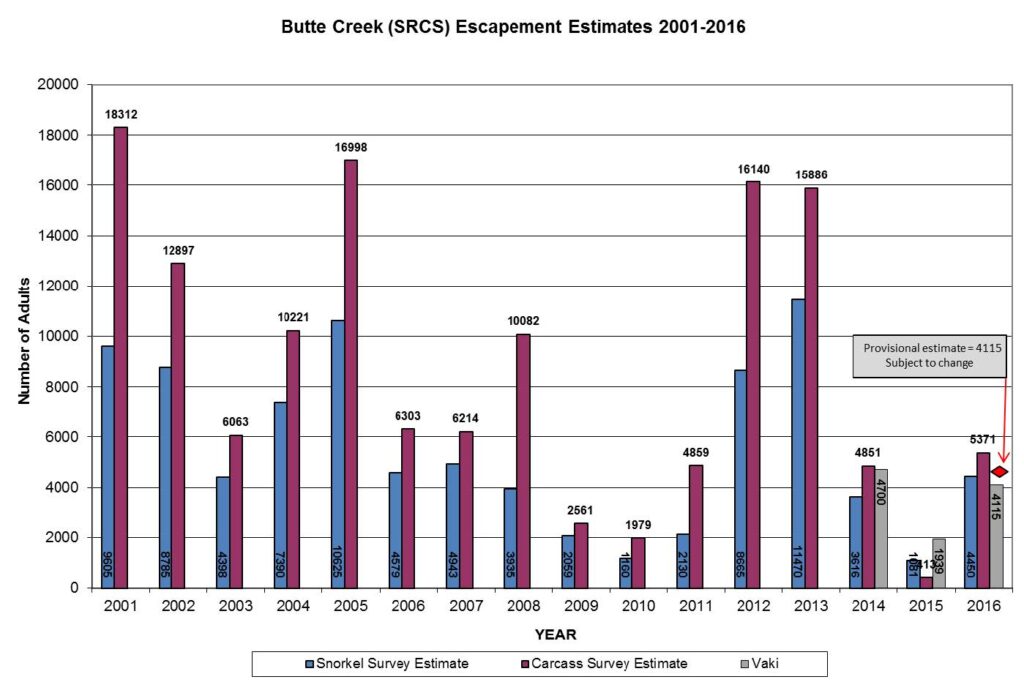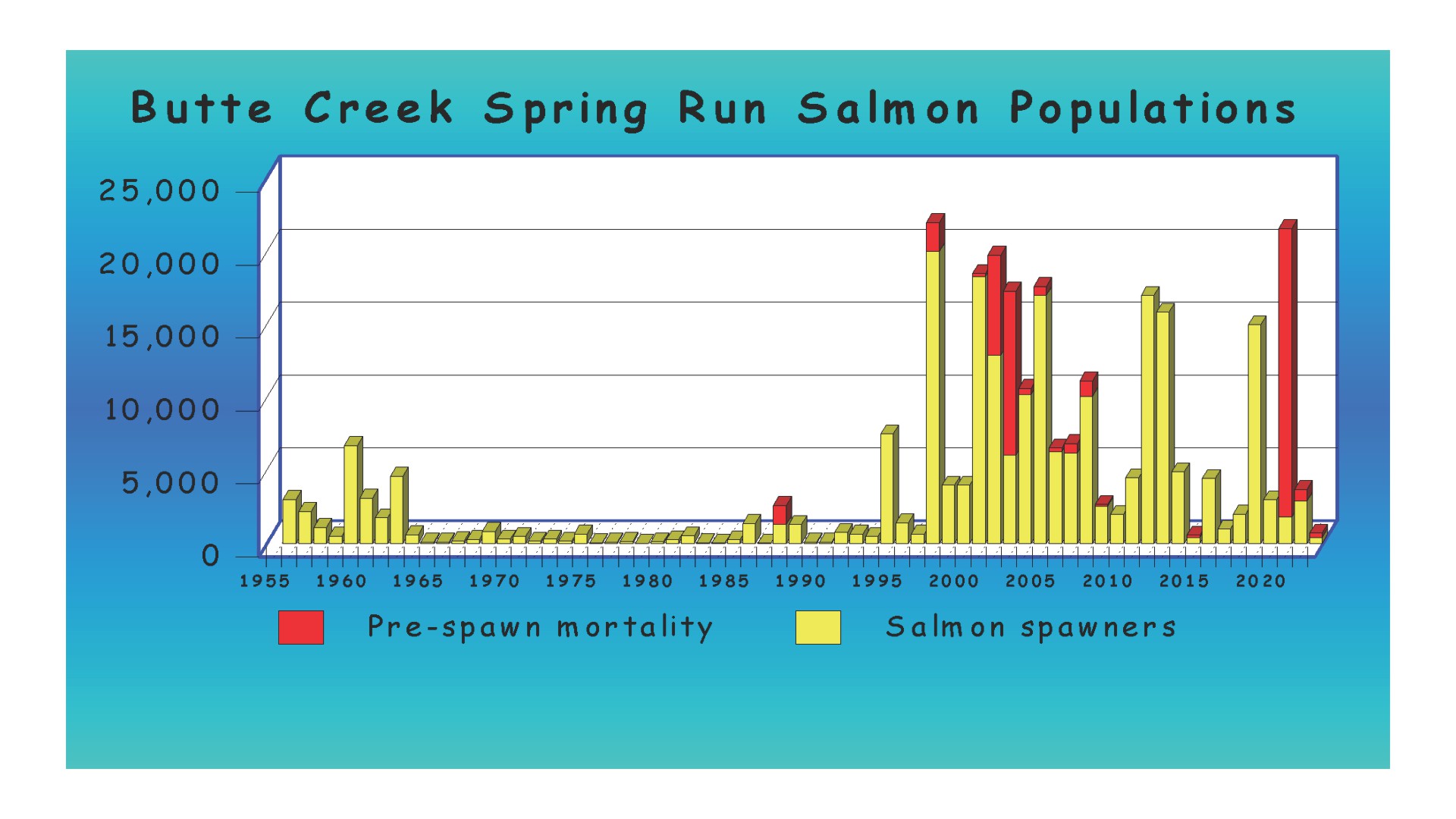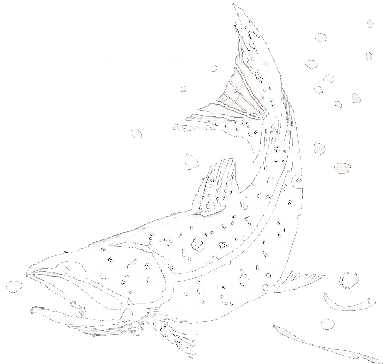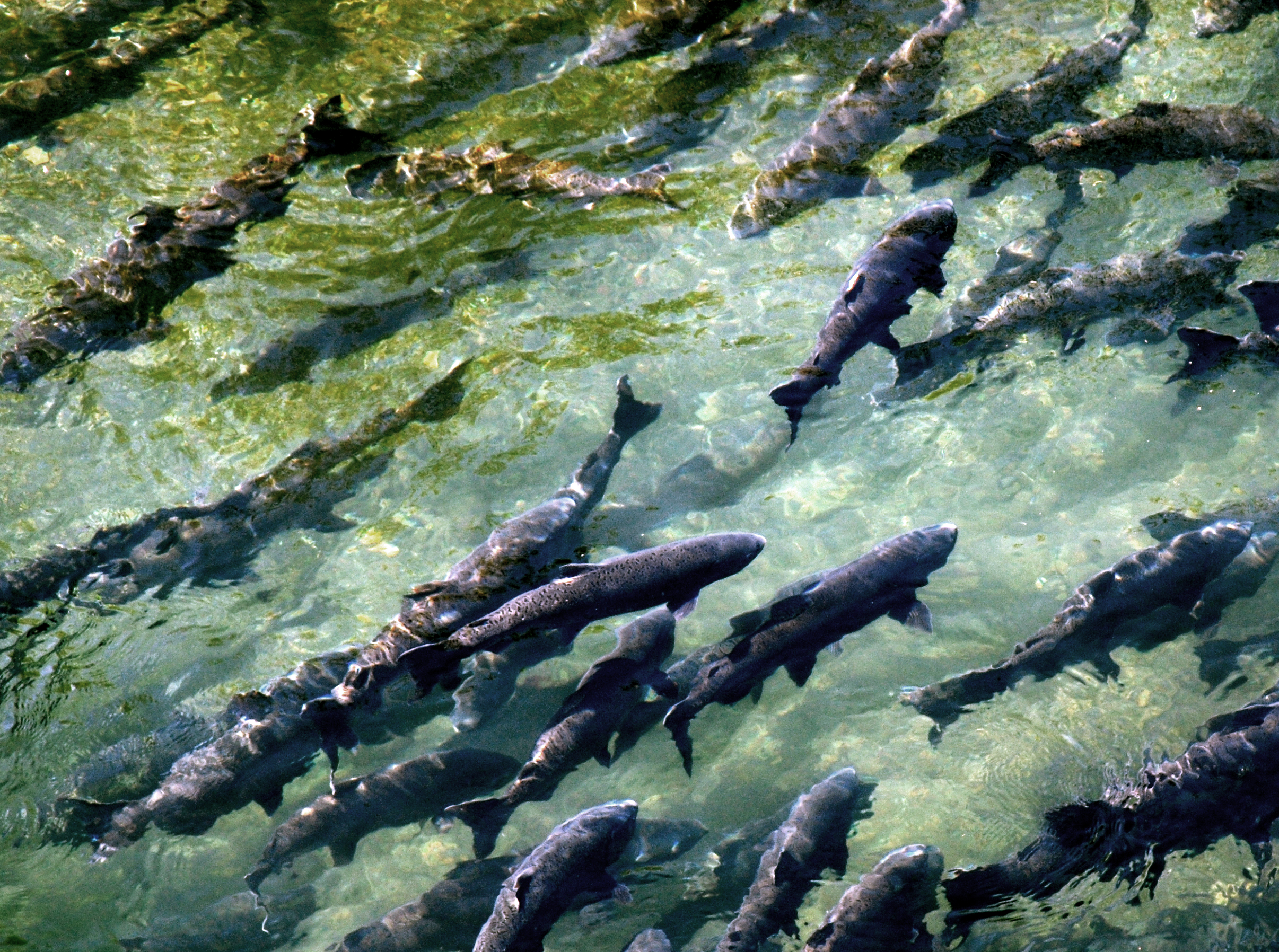California Dept. of Fish and Wildlife does a snorkel survey in August on Butte Creek and a carcass survey from the beginning of spawning until all known carcasses are counted. In the chart below you can see the relationship between snorkel and carcass surveys. CDFW states in the 2016 report: “Long term data suggests snorkel survey methodology likely underestimates the number of adults in Butte Creek when there are large populations. The snorkel survey is used to provide long term trends in populations.”


Spring Run Escapement and Pre-spawn Mortalities Click here for a pdf.
Butte Creek Spring Run Salmon Run Counts
Spawn 2024 – Snorkel Count 51
Spawn 2022 – Snorkel Count 2500
Spawn 2022 – Carcass 3688
Spawn 2021 carcass survey 21,500, pre-sapwn mortality 19,773 or 92% of the run
Spawn 2020 – Snorkel 1500
Spawn 2019 – Snorkel 6200, Carcass 14,900
Spawn 2018- Snorkel 2118
Spawn 2017 – Snorkel 980, Carcass 500
Spawn 2016 – Snorkel 4,450, Carcass 5,317
Spawn 2015 – Vaki camera est. 1,939, Snorkel 1,081, Carcass 413
Spawn 2014 – 4,894
Spawn 2013 – 15,866
Spawn 2012 – 17,000
Spawn 2011 – 4,500
Spawn 2010 – 1,979
1998 – Snorkel 20,000
2024 Butte Creek Spring-run Chinook Salmon Snorkel Survey
Click here
2022 Butte Creek Spring-run Chinook Salmon Adult Monitoring Annual Report
Click here
2021 Butte Creek Spring-run Chinook Salmon Adult Monitoring Annual Report
Click here
2021 Butte Creek Spring-run Chinook Salmon Snorkel Survey
Click here
2020 Butte Creek Spring-run Chinook Salmon Snorkel Survey
Click here
Butte Creek Spring-run Chinook Salmon Population Chart, 1955-2020
Click here
2019 Butte Creek Spring-run Chinook Salmon Snorkel Survey
Click here
2016 Butte Creek Spring-run Chinook Salmon Snorkel Survey
Click here
2015 Butte Creek Spring-run Chinook Salmon Pre-spawn Mortality
Click here
2013 Butte Creek Spring-run Chinook Salmon Pre-spawn Mortality
Click here
2013 Butte Creek Spring-run Chinook Salmon Carcass Survey
The Dept. of Fish and Wildlife counted carcasses by the thousands. They chop the older carcasses and tag fresh ones with a round disc. Counting the number of tags left after a week helps determine how many are being dragged off by the bears and other critters which improves the accuracy of the count. The total estimate for the 2013 spring run was 15,886, up by over 4,000 from the snorkel count of 11,470. Last year’s run was estimated at 17,000. Are we there yet? View 58 years of run numbers.
2013 Butte Creek Spring-run Chinook Salmon Snorkel Survey
As was expected the summer snorkel count is a near record and snorkel counts are historically low compared to actual numbers. With 11,470 counted, 2800 more than last year, we could be looking at a run of 18,000 or more. The all-time record is from 1998 with over 20,000 spawning salmon. Things are looking good. Read report.
2012 Butte Creek Spring-run Chinook Salmon Snorkel Survey
Click here
2011 Butte Creek Spring-run Chinook Salmon Snorkel Survey
Click here
2010 Butte Creek Spring-run Chinook Salmon Count
The final carcass count is in for the 2010 Butte Creek spring run and the decline continues. Only 1979 salmon were counted, the lowest number in 13 years. Sacramento Valley salmon are heading for extinction. We can not let this happen!
2009 The State of Salmon
Read Allen Harthorn’s State of the Salmon 2009.
1998 Snorkel Count
This was the first major return of Spring Run Chinook after screens and ladders were repaired at Gorrill Dam, Adams Dam, Durham Mutual Dam, and Parrott/Phelan Dam. The Western Canal Siphon was being constructed and two other dams had been removed, McGowan and McPherrin Dams. Read the CDFW Snorkel Report.
Restoration
Over $30,000,000 (see Restoration Handout) has been spent on improved fish passage in the lower watershed. Much of the best salmon habitat is blocked by Centerville Head Dam and still has reduced flows (71% to 82% reduction in summer) and increased water temperature below the dam.
Descriptions and status of various restoration projects is available here.
Spring Run Salmon
By all measures wild Butte Creek Spring Run have recovered, averaging over 10,000 salmon per year for the last twelve years (see Spring Run Population), while hatchery Fall Run stocks have collapsed. This years run is not so good. Tagged stray Butte Creek Spring Run have shown up in Battle Creek, Clear Creek, and the Feather River Hatchery.
Data provided by California Department of Fish and Game and is based on snorkel counts and/or carcass counts. Numbers are approximate and generally reflect pre-spawning live adults except where noted. Pre-spawn mortality numbers are provided in years where data has been made available.
The US Fish and Wildlife Service Anadromous Fish Restoration Program, often called the “Doubling Plan”, estimated that a population of approximately 3000 returning adults a year would represent a recovered Butte Creek spring run Chinook population. The fifty year average for Butte Creek is now over 2,700 adults per year. the thirty year average is 3,600+, the twenty year average is 5,400+, and the average for the last eleven years, counting the pre-spawn mortalities, is a staggering 12,000+. The Department of Fish and Game and PGE believe that the creek is saturated at 6,000 adults and refuse to open new habitat above the impassable Centerville Dam. Unfortunately the run collapsed this year to 2,561 spring run.
Friends of Butte Creek believes that Butte Creek spring run Chinook are fully recovered at 3000 fish per year unless new habitat is made available. This is a Public Trust Resource and it can not be wasted.
Steelhead Trout
Steelhead trout are not doing great but there is hope. Their habitat was greatly reduced by hydroelectric operations and all downstream migrants used to be diverted into the PGE flumes because there are no screens. As of December 3, 2024 PG&E has affirmed it will no longer operate either diversion, Butte Head Dam and Centerville Head Dam. This allows for the full flow of Butte Creek to pass through what was previously hostile habitat. We should see a significant rebound in trout populations.

